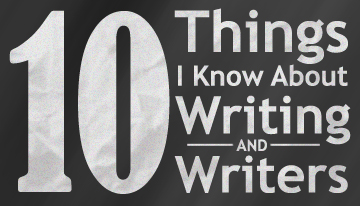
Now collected in a single place, I’ve brought over the list I put out on Facebook about 10 Things I Know About Writing & Writers (in no particular order). Just to be clear, I think I’ve learned more than just 10 things, but these were the highlights.
Finish the Book: A lot of people have ideas for books (or magazine articles, or children’s stories, or whatever), but those thoughts stay ideas unless you flesh them out and write them down. A writer starts and finishes the work. Corollary lessons include: “it’s okay to write a lousy first draft” and “you can’t edit a blank page.”
There’s no One Way to Write: Every writer has his or her own method, whether plotting out every detail before tackling the first draft, or strapping down in a chair and just going for it. Some writers prefer mornings or evenings, company or solitude, music or silence, cats or no cats (sacrilege!). The takeaway point is — do whatever works for you.
Each Character has a Story: We all think we are the heroes of our own stories, and characters are no different. They should have goals and motivations, stories and backstories and backstories to those stories. It should all be there, and the writer should know all of it, but these backstories don’t all end up in the book. Characters are like icebergs, not ice cubes.
Conflict is the Story: Without conflict, we’d just be reading about Aunt Maud’s trip to the grocery store, where she bought a can of peaches. No matter how beautiful the prose, how stunning the metaphors, how witty the dialogue, the story is dead without conflict. Stuff has to happen — little stuff, big stuff, earthshaking stuff even if for just one person. Go ahead, wage a little war.
Every Story has Already Been Told: Halfway through the best thing you’ve ever written, you will come across a book or (even worse) a movie telling the same story, even down to the same character names. Like you were channeling another author and didn’t know it. After an entire day of angst and Candy Crush, you shrug it off and tell yourself: every story may have been told before, but they haven’t heard my version of it.
Writers Use Industry Acronyms: Just like any other occupation, writers have their own obscure codes and abbreviations for things. Until you’ve been told by other writers that your WIP needs a better BBM before the TP, that you must RUE, as well as watch your POV, and by all means turn in your MS before you participate in NaNoWriMo, then you haven’t lived. (BTW: WIP = Work in Progress, BBM = Big Bad Moment, TP = Turning Point, RUE = Resist the Urge to Explain, POV = Point of View, MS = Manuscript, NaNoWriMo = National Novel Writing Month, of
Writing is a Lonely Vocation: We hole up in a cabin, or study, or closet, work for hours and hours on a project that we can’t share with anyone yet. Sometimes we get excited (or teary) about scenes and characters that other people won’t discover for years (if at all). There’s no office water cooler we can hang around and talk shop with coworkers. Non-writers don’t understand and think we’re weird. But, there’s always Facebook, and writers’ groups, and other ways to connect, so it’s not all that bad.
Comparison to other Writers is Pointless: Every writer is at a different point in his or her journey. Lamenting that another writes better prose, or another has written more books, or another has better sales, is a waste of time. Comparison is rooted in envy, and there’s no room for that in a healthy writing career. Each of us is unique, and besides, no one will see your true genius until after you’re dead — am I right?
Most Writers Hate Some Part of Writing: It’s not all unikittys and rainbows. Some detest the business angle, querying agents or publishers, negotiating contracts or meeting deadlines. Some dread the endless marketing, pushing the “product” and seeking exposure on the web or in public. Some even want to avoid the editing process, getting feedback from your editor or critique partners. And then there are authors like Douglas Adams, who famously hated writing. That bizarre notion fits perfectly with #10 on my list …
Writers are Crazy: Who else but a crazy person would choose to live this life? We stress out about imaginary people in fabricated places with real problems. We feel what our characters feel, when they hurt, or find love, or experience redemption. We wonder about things that no one else cares about, like how long can you survive a broken femur without medical treatment, or how long does it take to travel 20 miles downstream in a kayak? We worry when our writing sucks (will I ever be good?), and even when our writing is good (will I be able to do this again?). And yet if you ask a writer to give it all up and do something else more sane, like engineering, the answer is “no way!” We are compelled to put words onto paper, to dream up worlds and people them with heroes and villains, to tell stories about the truths we see around us, and we embrace it.
